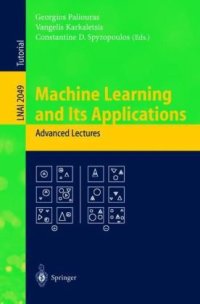
Ebook: Machine Learning and Its Applications: Advanced Lectures
Author: Yves Kodratoff (auth.) Georgios Paliouras Vangelis Karkaletsis Constantine D. Spyropoulos (eds.)
- Genre: Computers // Cybernetics: Artificial Intelligence
- Tags: Artificial Intelligence (incl. Robotics), Information Storage and Retrieval, Database Management, Business Information Systems, User Interfaces and Human Computer Interaction, Mathematical Logic and Formal Languages
- Series: Lecture Notes in Computer Science 2049 : Lecture Notes in Artificial Intelligence
- Year: 2001
- Publisher: Springer-Verlag Berlin Heidelberg
- Edition: 1
- Language: English
- pdf
In recent years machine learning has made its way from artificial intelligence into areas of administration, commerce, and industry. Data mining is perhaps the most widely known demonstration of this migration, complemented by less publicized applications of machine learning like adaptive systems in industry, financial prediction, medical diagnosis and the construction of user profiles for Web browsers.
This book presents the capabilities of machine learning methods and ideas on how these methods could be used to solve real-world problems. The first ten chapters assess the current state of the art of machine learning, from symbolic concept learning and conceptual clustering to case-based reasoning, neural networks, and genetic algorithms. The second part introduces the reader to innovative applications of ML techniques in fields such as data mining, knowledge discovery, human language technology, user modeling, data analysis, discovery science, agent technology, finance, etc.
In recent years machine learning has made its way from artificial intelligence into areas of administration, commerce, and industry. Data mining is perhaps the most widely known demonstration of this migration, complemented by less publicized applications of machine learning like adaptive systems in industry, financial prediction, medical diagnosis and the construction of user profiles for Web browsers.This book presents the capabilities of machine learning methods and ideas on how these methods could be used to solve real-world problems. The first ten chapters assess the current state of the art of machine learning, from symbolic concept learning and conceptual clustering to case-based reasoning, neural networks, and genetic algorithms. The second part introduces the reader to innovative applications of ML techniques in fields such as data mining, knowledge discovery, human language technology, user modeling, data analysis, discovery science, agent technology, finance, etc.